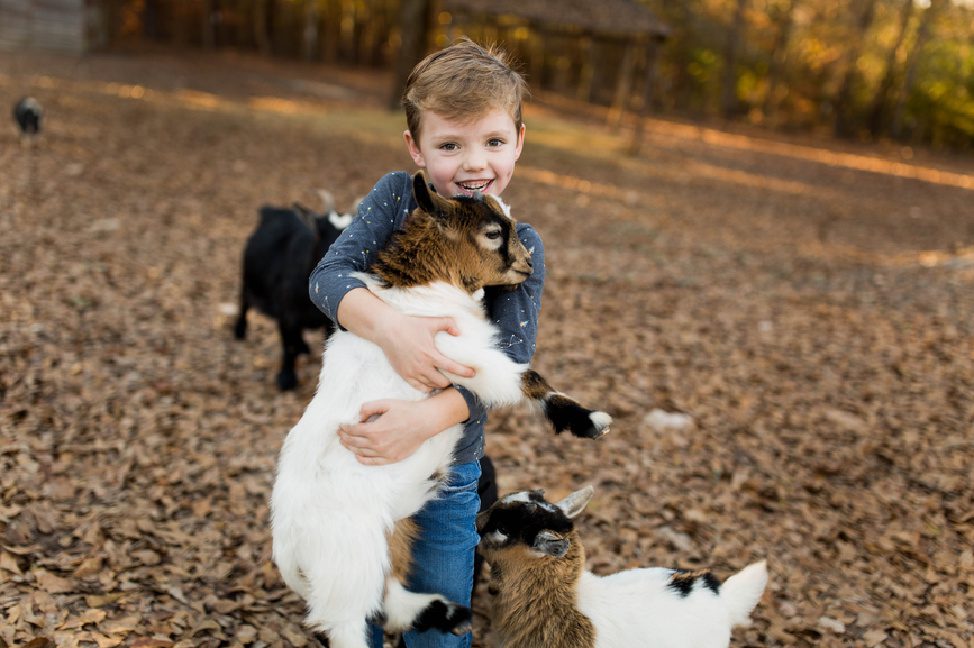Guest post by Maggie Dent
I like to define temperament as a continuum.
On one end you have ‘roosters’ and on the other you have ‘lambs’.
Among siblings, it’s common to have a mixture of roosters and lambs, and that is a good thing because in the classroom of life we learn most about relationships from those we live with.
Often a rooster child will help build confidence and strength in a lamb child, and a lamb child can soften a rooster so they can become a little more considerate. Essentially, we would like our kids, as they grow older, to be somewhere in the middle of the continuum.
This means they are able to be strong and assertive when they need to be, but they are also capable of being thoughtful and empathetic.
Temperament is a significant factor in parenting, for both parents and kids, and it really does play out in our homes (often in the classroom too, as any teacher will tell you).
Of course, this continuum is just a guide, but it can be helpful to examine your child’s temperament so you can help them build more capacity, and help yourself make better parenting choices based on their needs.
Every child is of course still unique and our job is to meet that person as honestly, respectfully and lovingly as we can.
One other thing to keep in mind is that temperament may be in your child’s biology but it does not guarantee the destination of your child as a human being on earth. Temperament does not have to be destiny.

Roosters
Rooster children are full of spunk and spirit almost from the get-go. You will find yourself in power struggles with them as they assert their own sense of importance.
As they approach their teen years, their push for autonomy will reach new heights. Roosters usually dislike sharing, want to win at all costs and want to be the centre of attention.
Seriously, if you have a rooster child as a toddler you will collapse most nights on the couch feeling defeated.
Common characteristics of rooster children:
• They yearn for independence and like to do things themselves.
• They are often loud, stubborn, driven and energetic.
• They need less sleep.
• They argue (even before they can speak!) over almost anything – food, clothes, toys.
• They can be manipulative and selfish.
• They want to go first.
• They dislike sharing.
• They are impatient and impulsive.
• They learn fast and like to learn by making their own mistakes.
• They get frustrated and angry often, and are happy to display that in public.
• They ask a lot of questions and will query your decisions.
• They can be entertainers – or ‘party animals’.
• They are very sensitive about what other people think.
• They enjoy change, challenge and adventure.
• They often make you feel you are the worst parent ever!
Roosters have a strong sense of their own importance, a domineering character, and seek to have power at any cost – and this affects girls and boys the same way.
As girls tend to have superior verbal skills to boys, right from a young age a rooster girl can tend to manipulate situations (and parents) masterfully – especially by exploiting guilt. If you let your four-year-old daughter get away with things because she simply wears you down, you will have a continuous battle on your hands as she gets older. I like to say that roosters have a PhD in pester power, especially at the shops.
Firm, loving boundaries are necessary right from the start.
Our rooster children can really struggle to feel empathy for others. Keep mentioning being caring, thoughtful and gentle, and possibly start by modelling with their toys and reading picture books in which characters model empathy – hopefully before their next sibling arrives!
Depending on your child’s maturity around the age of four, it can be a good idea to get a guinea pig, or another soft cuddly pet that has a shorter lifespan than a cat or a dog. Through the repeated stroking, cuddling and learning how to hold gently, the brain builds empathy pathways. The softening of the heart that can occur is shown by how your child responds when the guinea pig dies.
It’s important to note that lecturing our roosters, or disciplining them harshly, does not build empathy and a capacity to care for anything other than themselves. Harsh discipline doesn’t build relationships, it creates disconnection.
One of the benefits of having rooster children is they often love adventure, challenge and change. These things can be very exciting for them. However, if they have a lamb sibling who struggles with new opportunities, they can get quite frustrated with them.
Something else roosters tend to do is constantly questioning your parenting and asking ‘Why?’. While it can be very annoying, it’s good to remember that your child is asking questions because they want you to clarify a choice you’re making on their behalf.
If we want our children to grow up into self-assured, assertive adults who value themselves enough to speak up, then we need to really listen to them.
Sometimes their ideas are actually worthwhile and better than ours!
Having very strong, predictable boundaries is incredibly important in parenting roosters. They need to know where the boundary is because they will push up against it and challenge it, and they will need you to be strong enough to hold your ground.

Tips for parenting roosters:
• Focus on building positive attachment and connection.
• Avoid shouting, shaming or criticising roosters, as they will learn how to do this to others.
• Play cards and board games to teach them to take turns, to wait and to learn to lose graciously.
• As they often get into trouble, reassure them often that you love them.
• Hold firm boundaries around the big stuff, such as safety near roads, aggression towards siblings and others, inappropriate online behaviour and doing chores. Otherwise, ‘don’t sweat the small stuff’.
• Be sure to really listen to your rooster when they want to tell you how they think things could be.
• Avoid conflict with your rooster when angry, tired or exhausted – that goes for both of you.
• Give them small opportunities to develop autonomy or independence that make them feel important, or enlist them as a ‘special helper’.
• Rooster children of school age and tweens can benefit from team games and some individual sports like swimming, BMX, pony club and cross-country running. This helps build a healthy understanding of competitiveness and allows them to discharge excessive energy.
• The arts are another powerful, non-competitive way of expending energy and keeping them positively occupied.
• Spend time building their emotional intelligence by nurturing their patience, calmness and empathy.
• Join in their competitive online games so they don’t miss out on social learning while they’re playing. Better yet, to avoid roosters becoming dependent on or addicted to gaming.
• Being out in nature can be a powerful source of sustenance and calmness for roosters.
• Encourage close relationships with adults other than their parents; this can also give their exhausted parents a much-needed rest!
• Get a guinea pig, puppy or kitten so they learn how to be kind, caring and gentle.
Nurturing the connection with your rooster children is profoundly important, even though there will be times where you will need to be firm. It’s important to note here that roosters aren’t always selfish and insensitive – when they’re really heard and raised with firm but loving boundaries, they can become very thoughtful.
As I explore elsewhere in this book, the science of child development clearly shows that the more strongly attached a child is to their key caregiver, the more likely they will make choices to please them.
Let’s be honest, at times roosters are very hard to love and you will be frustrated beyond all measure. This is the classic reality of raising a strong, fearless, self-directed, confident child. After they have been sanctioned and you’ve had a big conversation explaining why the choices they made were poor – and helped them explore how to make better choices – remind them that you love them fiercely and unconditionally.

Lambs
I dedicate fewer words here to lambs and that’s because, well, they are generally easier to parent. The typical lamb will be quieter, more patient, more accommodating, compassionate and broadly more content with life than the average rooster. Generally, lambs are a delight and they make you look like a fabulous parent.
Common characteristics of lamb children:
• They love sleeping.
• They tend to dislike noise and too much stimulation.
• They are sensitive to being sanctioned or growled at.
• They may keep a comforter well into childhood.
• They like solo time.
• They are very patient and can wait while roosters go first.
• They get distressed easily by unfamiliar people, places and things
• They prefer routines and predictability.
• They take longer to warm up, even in social settings they are familiar with like playgroup.
• They withdraw when they feel frightened.
• They can easily be bullied or bossed around by roosters.
• They can lack assertiveness and be slow to make decisions.
Lambs can tend to be ‘slow to warm up’ in social situations, even when they know people. They might need a bit of time to feel comfortable interacting. It might seem like a good idea to push them in an effort to toughen them up, but it can be very stressful for sensitive children when they are forced to interact before they’re ready, which can result in them withdrawing further.
The same goes for shy children – it’s best to slowly build confidence by respecting their sensitive nature. That might mean staying somewhere for a shorter time initially, practising what to say when meeting someone for the first time, or letting them know you’ll be nearby or when you’ll be back.
Parents can help their lambs build courage and confidence by encouraging them to take risks in their play and learning. It’s great to do this when they are under five if possible. Playing with children who are older and younger than them can help them build capacity and assertiveness. Often, they will feel more confident than the younger children and they can learn what might be possible from the older ones.
It’s a mistake to assume that just because lambs are quieter and perhaps a little easier to get along with that they are by nature weak.
I know from my own lamb sons and many others that lambs can be quietly determined and show no less capability than roosters as they grow older, especially if they’ve had positive parenting and opportunities to develop mastery.
Tips for parenting lambs:
• Avoid shouting, shaming or criticising lambs as they can be crushed easily.
• Ensure you spend extra time building comforting patterns when they are babies and toddlers – soothing lullabies, night lights, bedtime rituals.
• Create small opportunities to develop mastery of small things to help them gradually build their self-confidence.
• Keep their world predictable with regular routines, especially around sleep.
• Affirm and encourage the caring side of their nature while teaching them to be careful not to be used or controlled by others.
• Explain that assertiveness is different from aggression. They need to learn to speak up and stand up for themselves by being assertive.
• Affirm that lambs are just as worthy and deserving of love, affection and acceptance as roosters (even if they don’t attract as much attention).
• Gradually expose them to social situations in small doses; however, when they’ve had enough, respect their needs and take them home.
• Reassure them often that you are beside them and that when you leave them for a time you are coming back.
• Avoid forcing them to do things when they hesitate; instead, encourage and be enthusiastic, and tell them ‘you will be able to do this when you are ready’.
• Lambs tend to have empathy for everything and can worry about nature and animals like they do people. Being in nature and having pets soothes their worries and anxiety.
• Allow them their own space when they want/need it.
• Encourage them to have conversations with you, as they often find it hard to be heard.
• Encourage them to rest before going out to build up their energy reserves.
• Teach them relaxation strategies for when they feel anxious and stressed.

Often children who are born with a lamb temperament have a natural degree of empathy from an early age and can sometimes become worried when unpleasant things happen, even on the other side of the world. Lambs can often have an irrational fear about the safety of their parents or people they love. It is important to be mindful of the media that lambs are exposed to. They are easily scared, and sometimes these moments of terror can be etched into their minds forever.
So, is your child a rooster or a lamb?
To learn more, read Maggie’s brand new book, Parental As Anything: A common-sense guide to raising happy, healthy kids – from toddlers to tweens.
About the Author: Maggie Dent has become one of Australia’s favourite parenting authors and educators. She has written eight major books including the bestselling Mothering Our Boys and her 2020 release, From Boys to Men. She hosts the ABC podcast, Parental As Anything and in July 2021 released a book of the same name published by ABC Books. This blog is an edited extract from that book. The print edition of Parental As Anything: A common-sense guide to raising happy, healthy kids – from toddlers to tweens is out in the UK on 14th October and the US on 19th October via Amazon. For more on Maggie, visit maggiedent.com

Comments